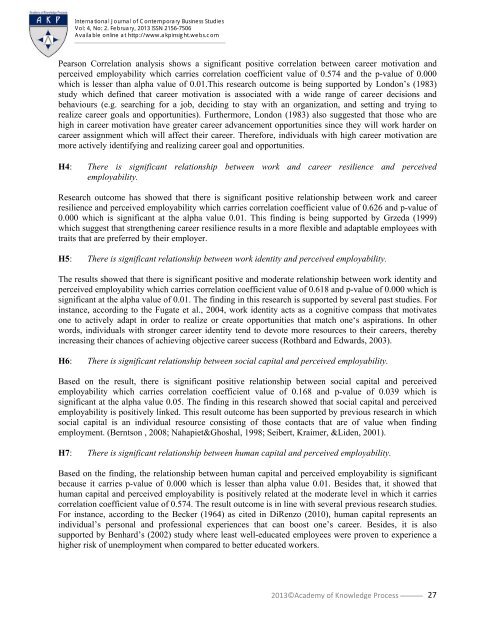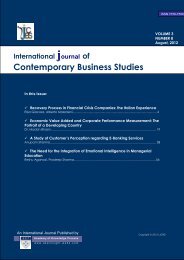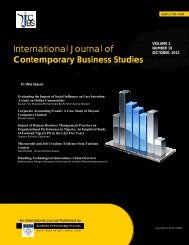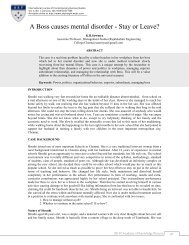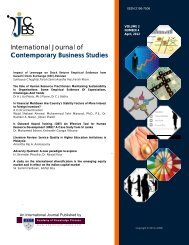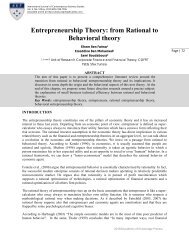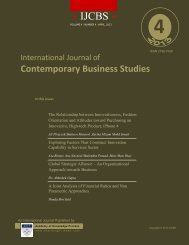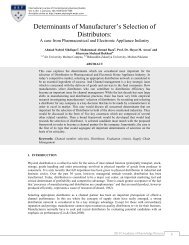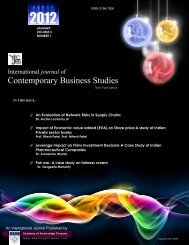Contemporary Business Studies - Academy of Knowledge Process ...
Contemporary Business Studies - Academy of Knowledge Process ...
Contemporary Business Studies - Academy of Knowledge Process ...
Create successful ePaper yourself
Turn your PDF publications into a flip-book with our unique Google optimized e-Paper software.
International Journal <strong>of</strong> <strong>Contemporary</strong> <strong>Business</strong> <strong>Studies</strong>Vol: 4, No: 2. February, 2013 ISSN 2156-7506Available online at http://www.akpinsight.webs.comPearson Correlation analysis shows a significant positive correlation between career motivation andperceived employability which carries correlation coefficient value <strong>of</strong> 0.574 and the p-value <strong>of</strong> 0.000which is lesser than alpha value <strong>of</strong> 0.01.This research outcome is being supported by London’s (1983)study which defined that career motivation is associated with a wide range <strong>of</strong> career decisions andbehaviours (e.g. searching for a job, deciding to stay with an organization, and setting and trying torealize career goals and opportunities). Furthermore, London (1983) also suggested that those who arehigh in career motivation have greater career advancement opportunities since they will work harder oncareer assignment which will affect their career. Therefore, individuals with high career motivation aremore actively identifying and realizing career goal and opportunities.H4: There is significant relationship between work and career resilience and perceivedemployability.Research outcome has showed that there is significant positive relationship between work and careerresilience and perceived employability which carries correlation coefficient value <strong>of</strong> 0.626 and p-value <strong>of</strong>0.000 which is significant at the alpha value 0.01. This finding is being supported by Grzeda (1999)which suggest that strengthening career resilience results in a more flexible and adaptable employees withtraits that are preferred by their employer.H5: There is significant relationship between work identity and perceived employability.The results showed that there is significant positive and moderate relationship between work identity andperceived employability which carries correlation coefficient value <strong>of</strong> 0.618 and p-value <strong>of</strong> 0.000 which issignificant at the alpha value <strong>of</strong> 0.01. The finding in this research is supported by several past studies. Forinstance, according to the Fugate et al., 2004, work identity acts as a cognitive compass that motivatesone to actively adapt in order to realize or create opportunities that match one‘s aspirations. In otherwords, individuals with stronger career identity tend to devote more resources to their careers, therebyincreasing their chances <strong>of</strong> achieving objective career success (Rothbard and Edwards, 2003).H6: There is significant relationship between social capital and perceived employability.Based on the result, there is significant positive relationship between social capital and perceivedemployability which carries correlation coefficient value <strong>of</strong> 0.168 and p-value <strong>of</strong> 0.039 which issignificant at the alpha value 0.05. The finding in this research showed that social capital and perceivedemployability is positively linked. This result outcome has been supported by previous research in whichsocial capital is an individual resource consisting <strong>of</strong> those contacts that are <strong>of</strong> value when findingemployment. (Berntson , 2008; Nahapiet&Ghoshal, 1998; Seibert, Kraimer, &Liden, 2001).H7: There is significant relationship between human capital and perceived employability.Based on the finding, the relationship between human capital and perceived employability is significantbecause it carries p-value <strong>of</strong> 0.000 which is lesser than alpha value 0.01. Besides that, it showed thathuman capital and perceived employability is positively related at the moderate level in which it carriescorrelation coefficient value <strong>of</strong> 0.574. The result outcome is in line with several previous research studies.For instance, according to the Becker (1964) as cited in DiRenzo (2010), human capital represents anindividual’s personal and pr<strong>of</strong>essional experiences that can boost one’s career. Besides, it is alsosupported by Benhard’s (2002) study where least well-educated employees were proven to experience ahigher risk <strong>of</strong> unemployment when compared to better educated workers.2013©<strong>Academy</strong> <strong>of</strong> <strong>Knowledge</strong> <strong>Process</strong>27


